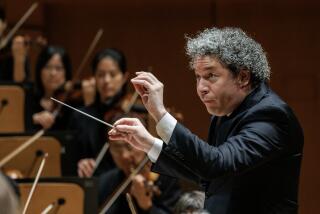Thrilling Kirov Orchestra Grabs Audience
The paradox of Valery Gergiev’s performance, with his mighty Kirov Orchestra, of Stravinsky’s “Sacre du Printemps” is not its power, compulsion or heart-stopping excitement. It is, for one who heard it not only Sunday night in the Dorothy Chandler Pavilion of the Music Center, but also last week at a tour stop in the Midwest, its utter artistic consistency versus its apparent spontaneity.
This performance, greeted with hoots of approval from a heated-up Pavilion audience, gave every evidence of being created on the spot, from the twin elements of intimate knowledge and momentary inspiration. Yet it resembled in every admirable way the reading heard just six days before, at the Indiana University’s South Bend campus.
Gergiev’s “Sacre” is unlike the polished and elegant readings we have become used to; it is vivid, ear-grabbing, rich in earthy detail, in moments slow and probing, in others rushed and precipitous. But, for all that, in this piece, the Kirov Orchestra--returning to Southern California this week after three years away, with performances over the weekend at the Orange County Performing Arts Center (previously reviewed) as well as at the Pavilion--maintains the thrilling sound-profile, the effortless musical continuity and magnificent visceral grip that are its signature virtues.
As shown here and in the program-opening works, the Prelude and Good Friday Music from Wagner’s “Parsifal” and Scriabin’s overcharged but wondrous “Prometheus: Poem of Fire,” this is not an orchestra with the immaculate and pristine perfection of some American symphonic ensembles.
It is, rather, a living musical organism, a large group of individual musicians who think and feel together and give their all to their heroic, all-hearing conductor. Their commitment is total; to point out small technical blurs or momentary imbalances would be to ignore their model ability to seize and hold an audience.
The “Parsifal” excerpts, later followed in an encore by the Prelude to Act 3 of “Lohengrin,” mirrored the palpable spirituality of Wagner’s most complex operatic statement; one heard the work’s layered action-in-contemplation, not merely lush sounds for the sake of lush sounds, which can make the pieces seem static.
Conversely, “Prometheus,” Scriabin’s most complicated--and, some would say, unfollowable--symphonic invention, had the benefit of an apprehendable continuity and pointing up of details, especially in the aggressive but transparent contribution of piano soloist Alexander Toradze. This is a difficult canvas, endlessly kaleidoscopic in instrumental colorations; it was helped here in no small way by Gergiev’s careful selection of high points and in the Pavilion’s helpful acoustics. For once, we could hear “Prometheus” as a sincere philosophical tract, with its sensational aspects treated respectfully. At the same time, all the virtuosic playing worked toward demystifying this multi-colored score.
Uncomplicated virtuosity marked the three encores--clearly, the enthusiastic audience would have welcomed a fourth--Liadov’s “Enchanted Lake”; the “Lohengrin” excerpt, again, as in Orange County on Saturday, super-fast but thrilling; and Berlioz’s “Racozky” March from “La Damnation de Faust.”
More to Read
The biggest entertainment stories
Get our big stories about Hollywood, film, television, music, arts, culture and more right in your inbox as soon as they publish.
You may occasionally receive promotional content from the Los Angeles Times.










